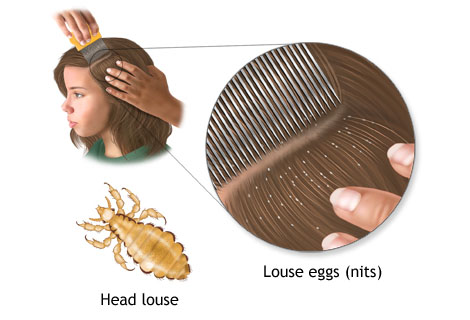 As many as 12 million children a year are affected by head lice. Lice do not transmit infections and do not endanger a person's health, but they are a nuisance. NBCS follows policies recommended by the American Academy of Pediatrics and the New Hampshire Office of School Health in its approach to screening students and recommending treatment for head lice.
As many as 12 million children a year are affected by head lice. Lice do not transmit infections and do not endanger a person's health, but they are a nuisance. NBCS follows policies recommended by the American Academy of Pediatrics and the New Hampshire Office of School Health in its approach to screening students and recommending treatment for head lice.
In any child found to have head lice, district employees ensure student confidentiality to avoid embarrassment to the child.
Head lice are spread by direct contact with the hair of an infested individual. Head lice move by crawling; they cannot hop, leap, or fly. Pets cannot spread head lice. Personal hygiene or cleanliness in the home or school has nothing to do with getting head lice.
Please watch your child for the following symptoms:
- The most common sign of an infestation is constant itching of the scalp.
- Inspect your child's head for the possibility of head lice. Look for nits(lice eggs): small whitish ovals fixed to the hair shaft, similar in appearance to dandruff, but not easily removed, and usually found within 1⁄4 inch of the scalp, especially behind the ears and around the back of the neck.
- Where nits have hatched, live lice may be seen. Lice are six-legged and oval in shape, light brown, and no larger than a sesame seed.
- If, upon inspection, you suspect that your child might have either nits or lice, it is strongly recommended that you discuss treatment with your healthcare provider. If you are not sure if your child has head lice, the diagnosis should be made by your health care provider.
The use of lice shampoos without evidence of lice or nits will not prevent your child from getting lice.
During the school year, it is a good idea to check you child's head weekly, as well as whenever he or she complains of having an itchy scalp. Talk to your child and remind him or her not to share or borrow combs, brushes, hats or scarves.
Please call the school nurse if you have questions. We would also appreciate a call to the school to let us know if you have treated your child for lice so we can monitor the situation.
Thank you in advance for your cooperation. Sources for more information about head lice:
Centers for Disease Control: http://www.cdc.gov/parasites/lice/head/index.html
NH Dept of Education Head Lice Info Page: http://www.education.nh.gov/instruction/school_health/faq_pediculosis.htm
American Academy of Pediatrics: http://pediatrics.aappublications.org/content/126/2/392.full.pdf



 The Goffstown Police Department (GPD) has partnered with SAU 19 to provide a community service to support our school volunteers. GPD will now accept SAU 19 volunteers at the police station during the hours of 9:00 AM and 3:00 PM, Monday through Friday.
The Goffstown Police Department (GPD) has partnered with SAU 19 to provide a community service to support our school volunteers. GPD will now accept SAU 19 volunteers at the police station during the hours of 9:00 AM and 3:00 PM, Monday through Friday. 
 The following calendars are available:
The following calendars are available: